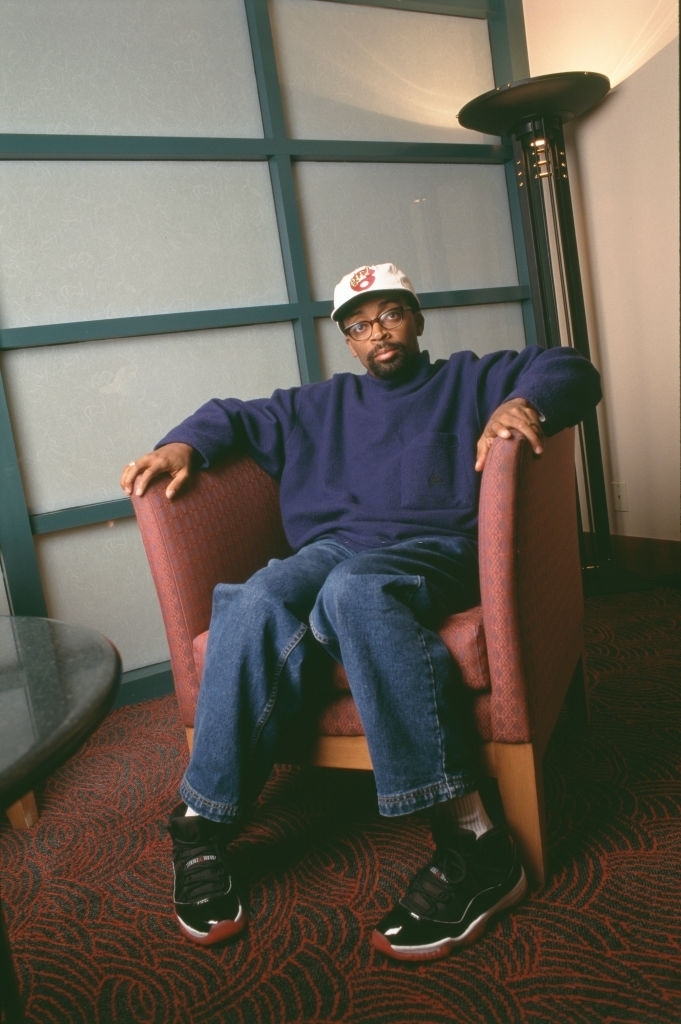How Spike Lee ‘s Movies Encapsulate the Black Experience

Spike Lee’s movies range thematically, but something congruent throughout them is his love and adoration for Black culture
Contribution by Niall Smith.

Shelton Jackson “Spike” Lee is best remembered for being a seminal Black filmmaker and director. Throughout his three decades in film, he has created some of the most timeless and thought-provoking movies.
Outside of his prolific film career, Lee also founded his own production company. 40 Acres and a Mule Filmworks has been active since 1979 and regularly issues merchandise. For sports and sneaker fanatics, Lee is renowned for being a fan of the New York Knicks. His close ties with basketball landed him in adverts for Nike alongside Michael Jordan. The adverts aired from the late 1980s into the early 90s. In the adverts, Lee portrayed Mars Blackmon, the deuteragonist from his first film ‘She’s Gotta Have It’.
Throughout the decades, Lee has been synonymous with culturally significant moments within Black culture. Lee and his now-acclaimed social-political perspective have kept his name in coffee table conversations. In celebration of Lee, a trailblazing figure in Black cinema, here is an analytical look at his film catalogue.

Spike’s movies range thematically, but something congruent throughout them is his love and adoration for Black culture. In his directorial debut ‘She’s Got to Have It’, Lee’s character Mars Blackmon is passionate about Air Jordan sneakers. Moving over to movies like ‘He Got Game’ and ‘Mo’ Better Blues’, both films serve as love letters to basketball and jazz music. Two pillars of Black entertainment.
His unconventional approach to cinematography helps to keep the viewer entertained throughout his lengthy projects. Lee is known to incorporate his now-signature double dolly in his movies. This shot is often saved for pivotal moments in the story. Lee is also renowned for dynamic camerawork. He uses dutch angles and point-of-view shots frequently.
Outside of his technical prowess, Lee is often recognised as a Black role model. His movie ‘Jungle Fever’ looks to examine the social problems that come burdened with interracial relations. ‘School Daze’ looks at Black students in higher education, colourism and black-on-black hatred.

The film ‘Malcolm X’ is widely regarded as Lee’s best work. Malcolm X takes a deep dive into the titular figure’s journey and life story. The movie helps paint X (Denzel Washington) in a more three-dimensional light. Lee had acknowledged that Martin Luther King, Jr. was always presented in media and textbooks as the acceptable Black leader. Lee uses the Malcolm X biopic to show the change, growth and development in X’s ideology as he got older. Lee also insinuates and alleges FBI and law enforcement had a part to play in Malcolm’s death. This theory adds to the lexical field of institutional racism present in many of his movies.
The movies ‘Do the Right Thing’ and ‘BlackKkKlansman’ examine the institutional factors that empower white supremacy. For the former, its police brutality. The film builds racial tensions throughout, which culminates in rioting in the wake of a race-related murder. For the latter, its white institutions that fund hate groups like the Ku Klux Klan.
In a 1993 Charlie Rose interview, Spike Lee said: “My six films I’ve done so for me show the variety of the African-American experience. Black people are not one monolithic group, we’re just as diverse as anybody. That is the reason why I make films, I grew up wanting to see that rich culture on-screen”.

Lee and his overall mission statement are best exemplified by his 1995 crime thriller ‘Clockers’. Produced by cinephile Martin Scorsese, the movie follows Strike (Mekhi Phifer), a young street hustler. Strike is torn between a life of crime, his incarcerated older brother and detectives trying to pin a murder on him. Instead of following the pre-established hoodie movie formula pioneered by John Singleton, Lee reimagines how atypical characters in this movie genre act. Instead of drinking malt liquor and driving a car with chrome rims (a typical Black Hollywood cliché), Lee subverts audience expectation. Protagonist Strike invests his money into his prized train sets and chocolate milk. This carries significance because Lee is trying to break the stereotypical mould and reconstruct the traits “thugs” would be expected to display.
Spike Lee embodies Black excellence. Each of his films can be looked at as a visual thesis of Black socialism to some degree. Through his movies, he has had educated people on the brilliance, terror and contradictions that make up the Black experience.
Contribution by Niall Smith.
Check out the GUAP Arts & Culture section, to discover new art, film, and creative individuals.




![ZINO VINCI’S ‘FILTHY & DISGUSTING’EP BRINGS YOU TO THE CORE OF THE ARTIST [@ZinoVinci]](https://guap.co/wp-content/uploads/2023/10/Zino-4.jpg)





![Remel London’s [@Remel_London] “Mainstream” is a must attend for upcoming presenters!](https://guap.co/wp-content/uploads/2017/02/REMEL-LONDON-FLYER-FINAL-YELLOW-COMPLETE-1.png)